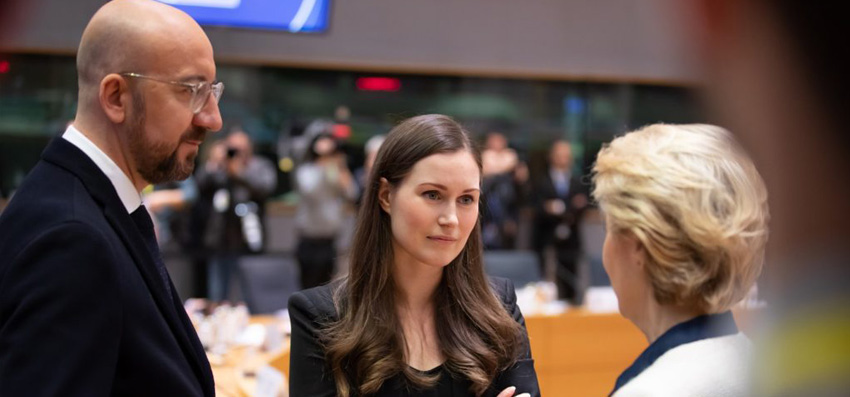In this article, published in Women’s Agenda, Madeline Hislop outlines how Finland could soon become the first country in the world to legally commit to carbon negativity. Recently, the Finnish parliament approved a new Climate Change Act, that would legislate a policy of carbon neutrality by 2035 and carbon negativity by 2040.
[Women’s Agenda] Finland will be a world leader on climate with its carbon negative goal
Finland could soon become the first country in the world to legally commit to carbon negativity.
On Wednesday, the Finnish parliament approved a new Climate Change Act, that would legislate a policy of carbon neutrality by 2035 and carbon negativity by 2040.
The new Climate Change Act would improve Finland’s absolute emissions targets to include at least 60 per cent reduction in carbon emissions by 2030, 80 per cent by 2040 and at least 90 per cent but aiming for 95 per cent by 2050 – compared to levels in 1990.
“It will ensure that the carbon neutrality target 2035 is maintained and that climate work continues beyond electoral terms,” Finland’s Minister of the Environment and Climate Change Emma Kari said when the proposed Climate Change Act was approved.
“The Climate Change Act is also a strong signal to companies that in this country clean solutions are worth investing in. I am particularly proud that the preparation of the Climate Change Act has been carried out in close cooperation with researchers, and the objectives set in the Act are based on scientific recommendations.
“Finland’s aim to build a fossil-free welfare state is a question that is related not only to the climate crisis but also to security policy. The faster we phase out our dependency on fossil resources, the better for the climate and for the security of Finland and Europe as a whole.”
In 2021, Finland’s Prime Minister Sanna Marin wrote an article published by the World Economic Forum, explaining her government’s approach to the climate crisis.
“Climate change and biodiversity loss are the most pressing challenges of our time, so all responsible political leaders must offer long-term policies for confronting them effectively,” Marin said. “We need clear strategies based on achievable targets, and we must be bold in deploying all means at our disposal. In particular, any credible climate strategy must take proper account of technological innovation.”
“But technology will not solve the climate crisis for us. We also need to create the right policy environment.
“The global transition away from fossil fuels will require a transformational shift in energy production and industrial processes. Even then, much more work will need to be done to develop a genuinely circular and green economy.
“The bottom line is that global emissions must peak soon if we want to achieve our emissions-reduction targets and avert future climate disasters. The full suite of promising new technologies will need to be developed, optimized, and deployed globally if we are going to create a fully climate-neutral, circular world economy.”
Sanna Marin talking to European Commission President Ursula von der Leyen in 2019.
When she was elected as leader of Finland, Sanna Marin was the world’s youngest prime minister, at age 34. She leads a 5-party coalition government led by women.
Original article and photo credit: womensagenda.com.au/climate/finland-will-be-a-world-leader-on-climate-with-its-carbon-negative-goal/
Associate Professor Magdalena Simonis AM is a Past President of the AFMW (2020-2023), former President of VMWS (2013 & 2017-2020) and current AFMW National Coordinator (2024-2026). She is a full time clinician who also holds positions on several not for profit organisations, driven by her passion for bridging gaps across the health sector. She is a leading women’s health expert, keynote speaker, climate change and gender equity advocate and government advisor. Magda is member of The Australian Health Team contributing monthly articles.
Magdalena was awarded a lifetime membership of the RACGP for her contributions which include past chair of Women in General Practice, longstanding contribution to the RACGP Expert Committee Quality Care, the RACGP eHealth Expert Committee. She is regularly invited to comment on primary care research though mainstream and medical media and contributes articles on various health issues through newsGP and other publications.
Magdalena has represented the RACGP at senate enquiries and has worked on several National Health Framework reviews. She is author of the RACGP Guide on Female Genital Cosmetic Surgery and co-reviewer of the RACGP Red Book Women’s Health Chapter, and reviewer of the RACGP White book
Both an RACGP examiner and University examiner, she undertakes general practice research and is a GP Educator with the Safer Families Centre of Research Excellence, which develops education tools to assist the primary care sector identify, respond to and manage family violence . Roles outside of RACGP include the Strategy and Policy Committee for Breast Cancer Network Australia, Board Director of the Melbourne University Teaching Health Clinics and the elected GP representative to the AMA Federal Council. In 2022. she was award the AMA (Vic) Patrick Pritzwald-Steggman Award 2022, which celebrates a doctor who has made an exceptional contribution to the wellbeing of their colleagues and the community and was listed as Women’s Agenda 2022 finalist for Emerging Leader in Health.
Magdalena has presented at the United Nations as part of the Australian Assembly and was appointed the Australian representative to the World Health Organisation, World Assembly on COVID 19, by the Medical Women’s International Association (MWIA) in 2021. In 2023, A/Professor Simonis was included on the King’s COVID-19 Champion’s list and was also awarded a Member (AM) in the General Division for significant service to medicine through a range of roles and to women’s health.

